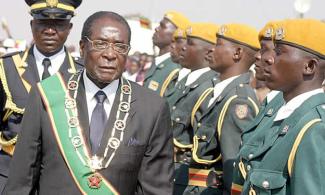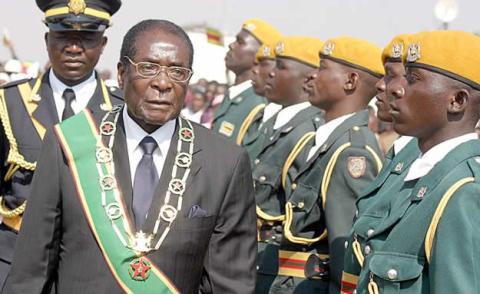
Lawmakers from his ruling ZANU-PF party said that they would take the first steps on Tuesday necessary to push Mugabe from office after the veteran leader ignored their ultimatum he resign by 1000 GMT Monday.
Zimbabwe’s President Robert Mugabe came under increasing pressure to quit after his ruling party said Monday it was prepared to force the defiant leader from power by moving to impeach him.
In a televised address late Sunday, the 93-year-old president flouted expectations he would step down after a military takeover, pitching the country into a second week of political crisis.
Lawmakers from his ruling ZANU-PF party said that they would take the first steps on Tuesday necessary to push Mugabe from office after the veteran leader ignored their ultimatum he resign by 1000 GMT Monday.
“We want to get rid of this animal called Mugabe, he must go. We have the numbers, the opposition is also going to support us,” said ZANU-PF MP Vongai Mupereri.
“We have got a clear position, we are going to impeach — the man has to go,” said another government MP, MacKenzie Ncube, speaking to AFP after a key meeting of ruling party lawmakers.
Once a simple majority of parliamentarians vote for impeachment, an investigative committee is formed by lawmakers, who report back to both houses of parliament. Each house must then vote by a two-thirds majority for him to be stripped of office.
Mugabe’s weekend speech capped an extraordinary weekend that saw Zimbabweans celebrate while also venting their anger in ways that would have been brutally repressed just a week ago.
But their joy quickly turned to despair as Mugabe brushed aside the turmoil, blithely declaring on Sunday he would chair a top-level meeting of the party that had just disavowed him.
Hundreds of noisy demonstrators gathered at the University of Zimbabwe in Harare on Monday to call for Mugabe to stand down.
Morgan Tsvangirai, the leader of the main opposition Movement for Democratic Change, called Mugabe’s speech a “complete reversal of the people’s expectations”.
“The so-called negotiation with the army did not produce the dignified exit that the nation was expecting.”
Chris Mutsvangwa, head of the influential war veterans’ association, called for less restrained protests than those staged at the weekend in an effort to dislodge Mugabe.
“He’s lost his marbles,” he said.
Though Mugabe has struggled with public speaking in recent years, the wily statesman appeared alert and attentive as he delivered his address.
“It might take days and weeks, but Mugabe is on his way out,” said Charles Muramba, a 46-year-old bus driver.
The crisis erupted on November 13 after a factional squabble over the presidential succession erupted into the open.
Mugabe’s wife Grace, 52, secured prime position to succeed him when 75-year-old vice president Emmerson Mnangagwa, who is close to the military leadership, was fired.
After Mnangagwa fled abroad, the army took over the country and placed Mugabe under house arrest.
The army insists it has not carried out a coup, but rather a police action to arrest allegedly corrupt supporters of the highly ambitious first lady.
When Mugabe refused to step down following behind-the-scenes talks, the generals unleashed people power.
In scenes reminiscent of Zimbabwe’s independence in 1980, crowds packed the cities, waving flags and chanting for Mugabe to resign.
On Sunday ZANU-PF dismissed him as its leader and demanded he resign as head of state, naming Mnangagwa as the new party chief.
Unruffled
Mugabe seemed unfazed in his speech and made no reference to the hostile chorus calling for him to go, describing last week’s dramatic military intervention as “no threat” to his rule.
Chris Vandome, an analyst at the Chatham House think-tank, warned that further delays heightened the risk of disorder.
“They will start impeaching him (Tuesday), that is certainly the will of the military, but it’s increasingly now the will of the people,” he told AFP.
“The longer this goes on for, the more the likelihood of violence increases.”
Some sources suggest Mugabe has been battling to delay his exit in order to secure a deal that would guarantee future protection for him and his family.
Mugabe was a key figure in the war for independence and took office as prime minister in 1980, riding a wave of goodwill.
But his reputation was swiftly tarnished by his authoritarian instincts, rights abuses and economic ineptitude.
Britain, Zimbabwe’s former colonial ruler, urged “everyone to refrain from violence”.
“What does appear clear is that Mugabe has lost the support of the people and of his party,” British Prime Minister Theresa May’s official spokesman said. (AFP)
